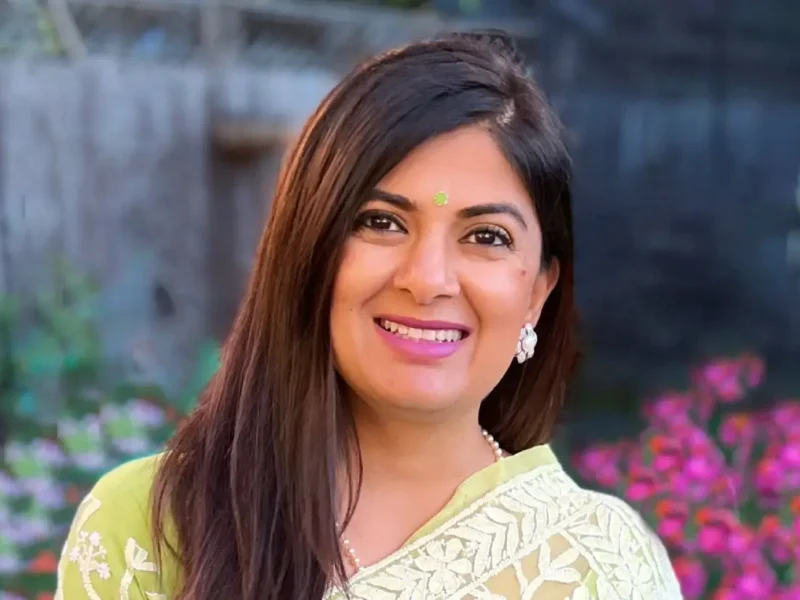
Annette Philip: Indian Music is at the Intersection of Freedom and Rules
By Nimmi Raghunathan
If you are a budding musician, the Berklee Collage of music in Boston is something you aspire to. If you are Indian American and have finer music tastes, the Berklee Indian Ensemble is something that fascinates and delights. A decade old now and with millions of YouTube hits, its unique choral arrangements, and exemplary collaborations with exceptional artists, have all been spearheaded by Annette Philip. For the viewer, she is the one with the wide smile, sparkling eyes, and colorful sarees effortlessly conveying a sense of joy.
Philip is a Keralite, with years spent in Singapore and Delhi which is where she first founded an artist collective. The ups and downs, mistakes, and epiphanies from each of these experiences brought her to the college where she not only founded the Ensemble but is also a faculty member. Fresh off the release of the Ensemble’s debut album she told India-West:
Q: You have worked with AR Rahman and Shankar Mahadevan. How different were their styles and what did you learn from them?
A: Rahman Sir had always been a musical hero of mine and is one of the most introspective people I’ve met in my life. He’s a wonderful mentor and a true genius as a musician, composer, arranger, and musical director. He is obsessed with sound while being very playful, and I learned to be even more exacting as a producer through my interactions with him at Berklee and my subsequent tours with him.
Shankar Mahadevan is such a virtuosic improviser, and master vocalist and composer. He is such an extrovert, ever willing to experiment and also be playful in music-making! He is wonderful at working a crowd, and each time we get to create with him, he surprises us with really unique variations – It’s a marvel to witness how his brain works, and his artistry astounds us constantly.
Q: What has been the response to your debut album?
A: The response to ‘Shuruaat’ has been heartwarming and overwhelmingly positive! First off, after a decade, our loyal fans are ecstatic to finally stream our music on Spotify, JioSaavn, Apple Music, and other platforms worldwide! It took us a long time to procure rights to do this, and so until now, our content was purely on YouTube. Secondly, fans and serious musicians from the arts industry are amazed that the album features 98 musicians from 39 countries, with 10 tracks that represent such a diverse mosaic of genres, languages, global cultural nuances, and energy!

Q: Why did you have Shreya Ghoshal reinterpret the track ‘Sundari Pennae?’
A: Berklee Indian Ensemble artist residencies always focus on exploring both the classic hits as well as relatively unknown works of our guests. Shreya Ghoshal’s discography is so vast, and when we came across Sundari Pennae and fell in love with two aspects immediately. One, we love odd-time signatures, and this was a song in 5! And the harmonium hook inspired us to experiment a ton with it. It’s such a sweet song, but we wondered what would happen if we completely deconstructed it, and added a progressive rock feel. Shreyaji loved our reinterpretation, and we’re so thrilled to have collaborated with her on this! (https://berkleeindianensemble.com/)
Q: Does it ever scare you to play around with iconic tunes? Have you ever got blowback for it?
A: It doesn’t scare us because we know we always approach re-arrangements with sincerity and respect. We honor the original intention of the composer by studying their music, analyzing the lyrics, and really delving deep into their artistic choices. From there, we begin experimenting, and as long as we stay authentic to ourselves, creative liberty is an artist’s right. We’ve never gotten negative feedback about our reinterpretations because I believe the audience understands that we’re paying homage to the original while staying true to ourselves.
Q: It’s almost magical when tunes and movements pop out of composing minds. Can you explain how the creative process works for you?
A: I draw inspiration from my environment (food, nature, colors, textures, paintings, film) as well as my emotions (memories from childhood, sensory memories of smell or taste, or even the feeling of relief from hugging a loved one). The technical aspects come from study but most importantly, taste, developed by listening to tons and tons of music from around the world. My process depends on the day, the goal of the project, or my mood. Sometimes while improvising freely, an idea will emerge that you fall in love with, and then it’s simply being resistance-free, allowing the song to tell you where it wants to go. Other times, you feel stuck, and you test different ideas till the jigsaw pieces come together and hope you like it the next day. As creators, we don’t always adore what we make, but the point is to keep showing up to create.
Q: Is there anything about Indian music that situates it uniquely for exploration?
A: Indian music sits at a delightful intersection of freedom and rules; rhythmic and melodic complexity juxtaposed with harmonic simplicity. That’s what has shaped the Berklee Indian Ensemble signature sound. Honoring Indian folk, classical, and Sufi traditions while allowing for chords, harmonies, and non-Indian stylistic elements to be blended.
Q: For Indian Americans you are this wonderful ambassador bringing us a cultured and elevated art form! Are you conscious of this? Is it a burden?
A: If I could choose to do it all over, I’d choose to be Indian again! From way back in 2011, I had a dream of finding a way to bring Indian music to our Berklee community (and beyond) in a way that allowed musicians from ANY cultural or musical background to enjoy expressing themselves. Our Indian culture is so rich, and it continues to evolve! To be able to bring the joy we feel as Indians (not just through our music, but our food, textiles, art, specific brand of humor, or literature and poetry) is a delight and privilege. Everything I do is done out of love, and to connect people through art. There are endless possibilities to revel in if we simply ask “what if” and “why not” and really that’s where each of our Berklee Indian Ensemble dreams were born (and subsequently achieved).
Q: Your wearing elegant sarees on stage – how did that evolve? Who picks them?
A: I was fascinated by sarees as a child, watching my mother gracefully drape them. I begged her to teach me, and I even had 1-2 “practice” sarees that mom pretty much gave to me to try on over and over and over! I find sarees to be the most sophisticated, sensual and comfortable clothing on the planet. A saree embraces you, and I even teach saree draping workshops now and then! I’m always excited to help people from any culture try on sarees and learn how to feel confident and wonderful in them! As for those I wear on stage, I lovingly pick out sarees from my personal collection that I’ve built myself, and through many I permanently borrowed from my mommy. If I could be a world ambassador for sarees, my life would be infinitely better!
SHORT TAKES
Favorite musician – How to choose? Inspired by AR Rahman, Karen Carpenter, Billie Eilish, Anoushka Shankar, Bobby McFerrin…
A must-do before stepping on stage for a recital – Do a huddle with your band and remember what a privilege it is to create and share music.
Last visit to India – March 2022, Kerala and Bangalore
Meaning of family – Where you can be yourself, love, and be loved unconditionally.
Favorite Indian dish – Appam and Stew, Fried Fish (mom’s) and Biriyani
A day off – Sleeping, reading, walking in nature, and playing with a cat (if I can find one)




